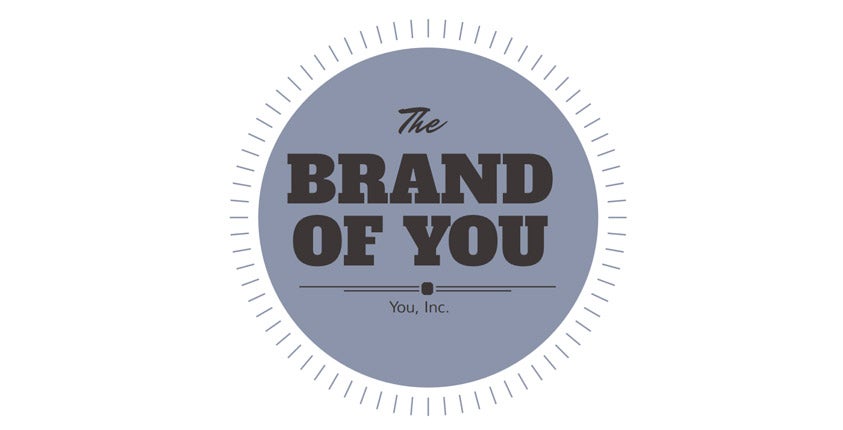The Brand of You

Let’s talk about you for the next few minutes, about your “Personal Brand,” the “Brand of You.”
There’s real value in identifying your personal brand, giving yourself a recognizable voice, and then leveraging it appropriately. It can be a very challenging, introspective, and yet rewarding process.
We’re going to find out more about you, what makes you tick, and what your branding motives are. In return, we’ll help you create and leverage the “Brand of You” in everything that you do.
Brand Differentiation
When it comes to branding, the first thing to understand is that you’re already doing it. You’re already a walking, talking billboard, shaping people’s perceptions of who you are and what you represent. But the question is: are you fully aware of what your billboard says about you? Can you articulate what makes you different from others, particularly those in your industry? What are the qualities, experiences, and skills that make you special?
Trying to define who you are and what you represent with words can be difficult. To help answer those questions, let’s complete a quick exercise that will help you identify the foundation of your brand.
Exercise:
- Create a list of personal attributes, including things like unique professional skills, life experiences, character strengths, and personality traits.
- Prioritize your attributes in order of importance. The key here is identifying attributes that you feel are the most important, the things you’re the most passionate about.
- For each attribute, ask yourself, “Why is this so important to me?” Your “why” is what guides the choices you make and how others relate to you.
Related: The Color of Branding
The purpose of this exercise is to reveal what you value the most about yourself. This is important because to create a strong brand, you have to stand for something—and do it in a really big way.
Brand Attributes and Value
Your brand is also a promise of the value you’ll deliver to your customer. Think about your attributes in terms of the people you help and what you help them with.
For each attribute, there’s a corresponding specific benefit or value. For example:
Attribute: I’m always on time. Value: I provide reliable service calls.
Attribute: I’m a great listener. Value: I help people solve problems.
So how does all this come back to you, your brand, and the importance of differentiation? Differentiation in your brand, and the value it represents, provides the foundation for your marketing efforts—and those will heavily influence customers’ purchasing decisions.
Listen To Your Customers
To see how your brand is perceived, listen to your customers. You have to talk to them, and really listen to and engage with them. Find out what they’re saying about you. What words do they use to describe you? If they referred you to someone they know, what words did they use when they introduced you?
Related: [Free eBook] Business Networking: Why, Where, & How
For example, when someone recommends John to a friend looking for a business advisor, they might say, “John is a great listener. He’s patient and helps me think through problems I’m facing in my business. He’s just a great problem-solver.”
Listening to your customers is a great barometer of how your business’s differentiation is viewed in the marketplace. And knowing what makes you different—what people value about you—will make you a better marketer.
Be Real
While listening to your customers is an important factor in refining and maximizing your brand, never lose sight of your voice. Be authentically you. People connect with other people who are real, imperfect at times, fun, and unique. Always question and reaffirm your beliefs; you must believe in your brand at all times.
Never lose sight of the fact that you’re not defined by a company or a title. The only “organization” you belong to for life is yourself. At times we can get this order confused, putting the brand of our company, products, or services before our own. Your brand should always come first.
Game Plan
Have a plan that allows your brand to be put in the most opportunistic settings possible—environments in which it can flourish. Develop an approach that incorporates all the elements of your branding: knowledge of your customers, what they’re saying about you, and how you are differentiating yourself.
Going back to a previous example, if part of your brand is being a great listener (attribute) and problem solver (value), join a local not-for-profit or professional group that works to solve problems in your industry and community. This would put your brand front & center in an environment in which it will be respected, sought after, and remembered.
Brand is Everything
Your brand is everything you do and don’t do. The same is true whether your small business has its own identity or is built around your personal name. It’s not just your logo, not the words on a sign, business card, or website. Your brand is every experience your customer has with you, from the moment they hear about you.
Related: Position Yourself as a Trusted Brand
Strive for consistency. Establish credibility. Join professional and community organizations, take or teach a class, give a lecture, start a blog, or contribute to an e-newsletter. Constantly search for ways to get your name out there and put your brand in the best position possible.
Don’t stay static and don’t be afraid to adjust your brand based on new experiences or feedback from your customers and peers. When you are the brand, you must always be on the move, and ready to adjust your plan as needed. Remember, the success of any branding campaign ultimately depends on what the market thinks. Your personal brand is no different.
